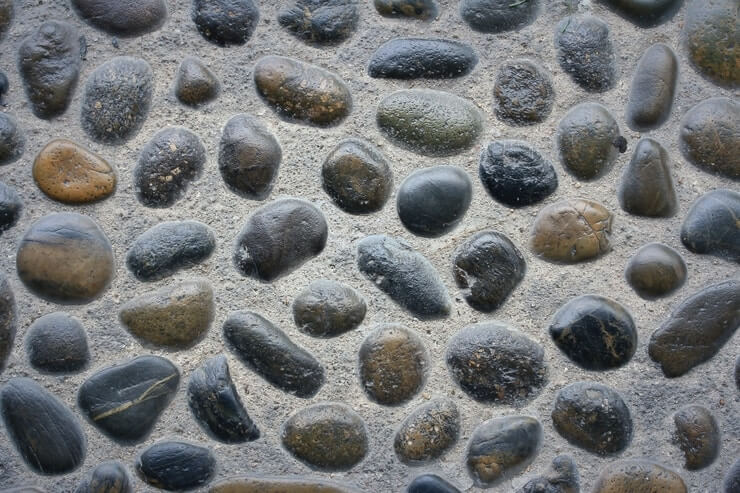A pebble shower floor, also known as a river rock floor, is an inexpensive eye appealing option for a bathroom remodel.
Some people have visited local rivers to collect stones, which saved them a lot of money on the cost of materials.
Deciding on whether a pebble shower floor is best for your bathroom will depend on many factors, and every material has its pros and cons.
This article will discuss the pros, cons, and alternatives of pebble shower flooring to help you decide if river rock flooring is a viable choice for your next bathroom remodel.

Pros of a Pebble Shower Floor
- Slip Resistant
Pebble flooring is not slippery when wet and is safe to walk on when soaking wet. This slip resistance is critical in the shower, where many slip and fall accidents can occur. River rock flooring gives you a safe, slip-free shower experience.
- Easy Installation
Though laying out the pebbles themselves can be time-consuming work, the installation process is quite simple and can be done by yourself without the need to pay a professional.
- Comfortable on Your Feet
For most people, pebble or river rock flooring is known to have a comforting massage-like texture that can be quite soothing on your feet. Make sure your river rock is round and smooth to ensure they will be comfortable.
- Amazing Unique Finish
Pebble flooring has a superb look and finish when compared to most acrylic and tile flooring. Additionally, you may choose any number of unique pebble combinations to create a one-of-a-kind look.
Cons of a Pebble Shower Floor
- Lifespan
When compared to other types of flooring, pebble does not have the greatest lifespan. Even by yearly resealing a river rock floor, it will only last up to 15 years. In comparison, a tile floor can last up to 30 years, and other types of natural stone flooring can last for up to 50 years.
- Maintenance
Every type of shower flooring will have some type of maintenance associated with it. Pebble flooring will require more maintenance than most other types of flooring. This maintenance will be in the form of resealing to keep your floor waterproof. This resealing must be done every six months to one year.
- A lot of Grout
Though installation of pebble flooring can be an easy job, the work becomes considerably more challenging when it comes to grouting a pebble shower floor. The small pebbles leave a lot of nooks and crannies between them that must be covered with grout. This can lead to extra work and additional maintenance. Using larger stones can help negate this issue.
- Mold Risk
Any type of shower flooring carries some risk for mold. But with pebble flooring, the risk is a little higher than most other materials. This is due to a few factors: the additional grout and the greater need for maintenance. If you forget to reseal your floor or adequately care for your grout, water may seep through your flooring, causing mold.
Alternatives to Pebble Shower Flooring
Porcelain Pebble Tile
Porcelain pebble tile looks a lot like stone pebbles, except they are made of porcelain.
These tiles give you the look of stone pebbles without any drawbacks, such as having to reseal every six months to a year. Instead, porcelain tiles require resealing every 3 to 4 years.
But porcelain pebble flooring will usually cost you more than natural stone pebbles, and you will still have the same issues with grout.
Mosaic Tiles
Mosaic tiling gives you the same unique styling that is achieved through river rock flooring. Some would argue that mosaic tiled floors have a more refined beauty than stone pebble flooring.
Mosaic tiles are similar to river rock in their installation process and price. Like porcelain tile, they carry an advantage over river rock flooring as they only need to be resealed every couple of years.
Penny Tile
Penny tiles are round tiles made of ceramic, porcelain, or glass. Penny tiles are all exactly the same size, so they may not look precisely like pebble flooring would, but they do come close.
Due to the material they are made of, they carry an advantage over river rock and do not require yearly resealing. There are even DIY purists that have used actual coins as penny tile, though I’m not sure how effective coins would be as shower flooring.
FAQ
With diligent care of the grout and resealing, your pebble stone floor can last for 15 years. It is possible that your pebble flooring may last longer, but this will depend on how often your shower is used and how well your flooring was installed.
Yes, you can paint stone pebble flooring. But when painting anything in your shower, you will need to take appropriate steps such as choosing a waterproof primer, paint, and sealant to ensure your paint job can withstand water.
No, due to the additional grout installed in a river rock shower floor, the surface becomes quite slip resistant even when wet. As a result, river rock is considered one of the safest shower flooring options available.
Yes, pebble shower flooring requires sealant upon installation to remain waterproof. Your floor will then need a reseal every six months to a year, depending on how heavily your shower is used.
No, is it not too difficult to clean river rock flooring. There are more accessible materials to clean, such as acrylic. But using a rag and some soap every week or two will keep your stone pebble flooring in pristine condition.
Yes, most people describe them as a massage for your feet. River rock has been naturally smoothed and rounded by water and makes it a very comfortable choice.

